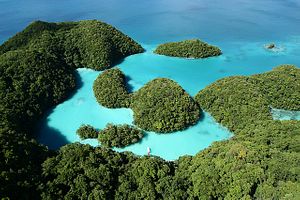Koror, Palau played host last week to the 45th annual meeting of the Pacific Islands Forum, a political grouping of mostly small states in the Pacific Ocean, including Australia and New Zealand. The theme chosen by the Government of Palau for the meetings, “The Ocean: Life & Future,” hints at both the outsized importance of ocean conservation for the Pacific Island countries and the potentially devastating impact climate change and environmental degradation will have on the region.
The Palau Declaration, summing up the four days of discussion, points as much to human impacts like overharvesting and overfishing, pollution, and illegal, unreported and unregulated fishing (IUU) as it does to the rising sea levels, warming oceans, and extreme weather events driven by an increase in global carbon dioxide emissions. Unlike most countries in the rest of the world, the threat is existential for the Pacific nations. The potential loss of territories to rising sea levels presents, in the words of the declaration, “the greatest threat to the livelihoods, security and well-being of the peoples of the Pacific.”
The Forum members called on the international community to help address issues like overfishing and IUU that can bring about a significant loss in fisheries earnings for the Pacific Island countries. But they also stressed the need for fixing baselines and maritime boundaries to ensure that rising sea levels don’t affect existing jurisdictions. The Palau Declaration will be handed to the UN Secretary-General and a list of current and proposed initiatives of the Forum members will also inform their efforts towards other initiatives such as the UN’s Sustainable Development Goals.
On the administrative side of things, this year’s meeting held a review of the Pacific Plan, which aims to strengthen cooperation and regional integration in the Pacific and was endorsed by leaders back in 2005. The review found, in short, that there was great confusion over the priorities behind regional integration and that the institutions and governments involved had been “lost in translation.” Pacific regionalism was a “largely officials-led process,” dominated by “bureaucratic and institutional interests.”
Of course, similar things could be said of more successful examples such as the European Union or ASEAN. The difficulty for the Pacific countries is that there is very little trade among members and arguably no one country is able or willing to lead efforts to draw up a much more effective regional architecture. Neither Tony Abbott nor John Key even bothered to attend this year’s meeting. Fiji, a possible counterweight, has been suspended since current President Frank Bainimarama came to power through a military coup in 2006. The Forum did agree this year to reinstate Fiji’s membership if the country’s upcoming elections in September are found to be free and fair.
Fortunately, the Pacific Islands Forum may have found itself a credible new leader. In Palau, Papua New Guinea’s Dame Meg Taylor was elected the forum’s new Secretary General. A Harvard graduate, former ambassador to the United States, Mexico and Canada, and former vice-president of the International Finance Corporation, Taylor boasts a wealth of experience in navigating regional and international institutions. Focusing those efforts on streamlining the Pacific Island Forum while also practically advancing the key strategic objectives of the Pacific countries will be her biggest challenge.

































